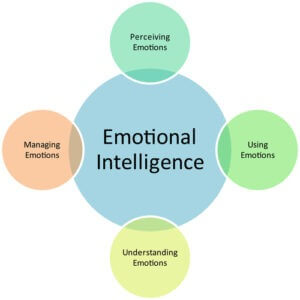Advice for Employers and Recruiters
What’s your E-IQ ?
During the selection process, hiring managers are usually interested in education, skills, experience of the job candidate and cognitive abilities. Another key indicator of success in the workplace is emotional intelligence. Commonly known as EI, emotional intelligence is the ability of a person to identify, evaluate, and manage personal feelings and those of other people, as individuals or as groups.
While technical skills may be learned through observation and on the job experience, it’s a long process for a person to develop emotional intelligence through training. Recent surveys indicate that over 71 percent of employers value emotional intelligence over IQ. This is a staggering statistic, but it shows how much emotional intelligence can be a factor in overall workplace success.
A combination of traits is thought to determine emotional intelligence such as self-awareness, self-management, social awareness and relationship management. Having a high level of emotional intelligence is demonstrated by:
- Leading by example
- Having empathy for team members
- The ability to make thoughtful, informed decisions in regards to business matters
- Remaining calm under pressure
- Having the skills to solve conflicts conclusively
Just like cognitive skills are measured through testing, emotional intelligence skills can also be measured. To assess the level of EI when hiring, you may want to use a combination of testing, and your gut instinct. Specific observations and behavioral questions during the interview can give insight into a candidate’s EI. Questions such as those that seek to determine whether an employee admits their mistakes when they arise and learns from them, and questions geared to see how they take criticism are examples. Other observations such as seeing if the person listens as much as they talk or they talk more than they listen are good indicators.
Commonly used emotional intelligence tests, include the Mayer, Salovey, Caruso Emotional Intelligence test (MSCEIT) and the Bar-On Emotional Quotient testing models. These tests present emotional situations to test takers, and then have the respondent choose their reaction to the described situations. One of the biggest problems with these types of tests lies in what researchers call self-reporting bias (whereas the respondent rates themselves higher than in actuality).
Employees with a high level of self-awareness are more likely to have strong emotional intelligence. A candidate who conveys the ability to control compulsions without jumping to conclusions is better poised to succeed at work than those who act on impulse. People who understand themselves have the ability to understand their emotions, especially those emotions that may affect their performance at the workplace.
Assessment of emotional intelligence helps an organization determine how well a candidate will perform in terms of development, leadership, teamwork and organization building, credibility, global versatility, and social responsibility. Including emotional intelligence testing in your overview of candidate skills is a powerful way to ensure you hire employees who will be a good fit for your corporate culture and help lead the company to success.
“This post was written by Jeri Johansen, PHR –Human Resources Manager at Crimcheck.com and Chair of the 2014 Northern Ohio Human Resource Conference (www.nohrc.org). Crimcheck.com specializes in employment screening and background checks. You can find Crimcheck.com on Linked In, Facebook and Twitter also.”
New Job Postings
Advanced Search